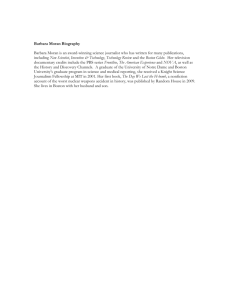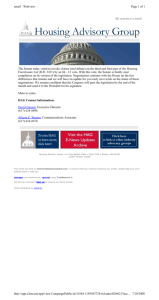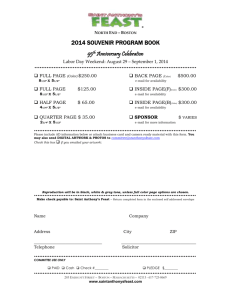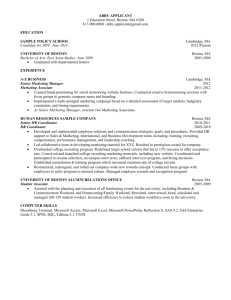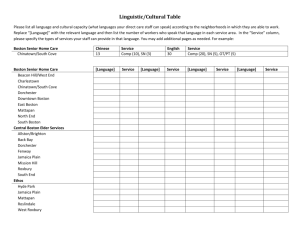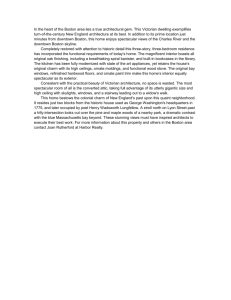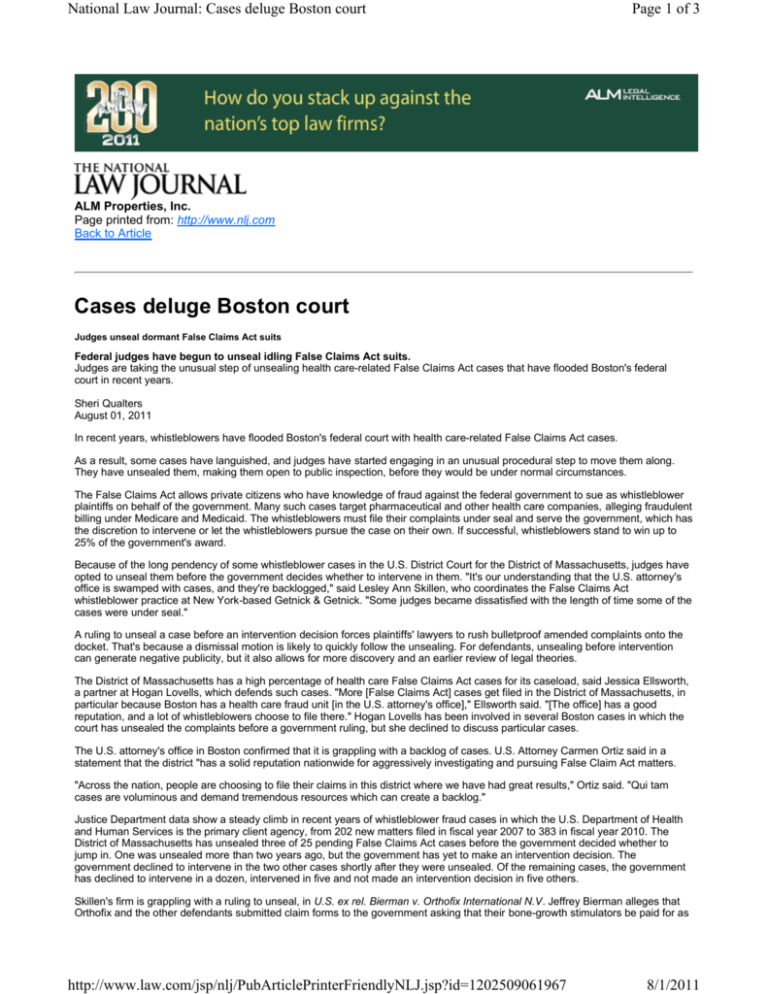
National Law Journal: Cases deluge Boston court
Page 1 of 3
ALM Properties, Inc.
Page printed from: http://www.nlj.com
Back to Article
Cases deluge Boston court
Judges unseal dormant False Claims Act suits
Federal judges have begun to unseal idling False Claims Act suits.
Judges are taking the unusual step of unsealing health care-related False Claims Act cases that have flooded Boston's federal
court in recent years.
Sheri Qualters
August 01, 2011
In recent years, whistleblowers have flooded Boston's federal court with health care-related False Claims Act cases.
As a result, some cases have languished, and judges have started engaging in an unusual procedural step to move them along.
They have unsealed them, making them open to public inspection, before they would be under normal circumstances.
The False Claims Act allows private citizens who have knowledge of fraud against the federal government to sue as whistleblower
plaintiffs on behalf of the government. Many such cases target pharmaceutical and other health care companies, alleging fraudulent
billing under Medicare and Medicaid. The whistleblowers must file their complaints under seal and serve the government, which has
the discretion to intervene or let the whistleblowers pursue the case on their own. If successful, whistleblowers stand to win up to
25% of the government's award.
Because of the long pendency of some whistleblower cases in the U.S. District Court for the District of Massachusetts, judges have
opted to unseal them before the government decides whether to intervene in them. "It's our understanding that the U.S. attorney's
office is swamped with cases, and they're backlogged," said Lesley Ann Skillen, who coordinates the False Claims Act
whistleblower practice at New York-based Getnick & Getnick. "Some judges became dissatisfied with the length of time some of the
cases were under seal."
A ruling to unseal a case before an intervention decision forces plaintiffs' lawyers to rush bulletproof amended complaints onto the
docket. That's because a dismissal motion is likely to quickly follow the unsealing. For defendants, unsealing before intervention
can generate negative publicity, but it also allows for more discovery and an earlier review of legal theories.
The District of Massachusetts has a high percentage of health care False Claims Act cases for its caseload, said Jessica Ellsworth,
a partner at Hogan Lovells, which defends such cases. "More [False Claims Act] cases get filed in the District of Massachusetts, in
particular because Boston has a health care fraud unit [in the U.S. attorney's office]," Ellsworth said. "[The office] has a good
reputation, and a lot of whistleblowers choose to file there." Hogan Lovells has been involved in several Boston cases in which the
court has unsealed the complaints before a government ruling, but she declined to discuss particular cases.
The U.S. attorney's office in Boston confirmed that it is grappling with a backlog of cases. U.S. Attorney Carmen Ortiz said in a
statement that the district "has a solid reputation nationwide for aggressively investigating and pursuing False Claim Act matters.
"Across the nation, people are choosing to file their claims in this district where we have had great results," Ortiz said. "Qui tam
cases are voluminous and demand tremendous resources which can create a backlog."
Justice Department data show a steady climb in recent years of whistleblower fraud cases in which the U.S. Department of Health
and Human Services is the primary client agency, from 202 new matters filed in fiscal year 2007 to 383 in fiscal year 2010. The
District of Massachusetts has unsealed three of 25 pending False Claims Act cases before the government decided whether to
jump in. One was unsealed more than two years ago, but the government has yet to make an intervention decision. The
government declined to intervene in the two other cases shortly after they were unsealed. Of the remaining cases, the government
has declined to intervene in a dozen, intervened in five and not made an intervention decision in five others.
Skillen's firm is grappling with a ruling to unseal, in U.S. ex rel. Bierman v. Orthofix International N.V. Jeffrey Bierman alleges that
Orthofix and the other defendants submitted claim forms to the government asking that their bone-growth stimulators be paid for as
http://www.law.com/jsp/nlj/PubArticlePrinterFriendlyNLJ.jsp?id=1202509061967
8/1/2011
National Law Journal: Cases deluge Boston court
Page 2 of 3
purchased items when they should have been billed and paid for as rental items. He also claims that the defendants represented
that the stimulators were medically necessary for time periods longer than the patients actually needed. His complaint alleges that
the companies falsely certified compliance with Medicare provisions and gave kickbacks to doctors and third-party suppliers.
The complaint was unsealed in April 2009, but the government hasn't decided whether to intervene.
Hogan & Hartson is part of the defense team on the Orthofix case, but Ellsworth declined to discuss the case.
Susan Schneider Thomas, a partner at Philadelphia's Berger & Montague, said there's a perception among the whistleblower bar
that the District of Massachusetts is "looking to accelerate the process and get a decision out of the government."
PUSHING THE GOVERNMENT
Berger & Montague was part of the whistleblower's legal team in U.S. ex rel. Carpenter v. Abbott Laboratories. Patrick Carpenter
alleged that Abbott defrauded government medical programs through kickbacks to boost sales of its HIV/AIDS treatment drug
Kaletra and promotions for uses not approved by the U.S. Food and Drug Administration. In April 2009, Judge William Young lifted
the seal, and the government declined to intervene. Last month, the court granted the parties' joint motion to dismiss voluntarily.
"We have the sense that the district has kind of adopted the practice where the judges are pushing the government to come with a
decision in a year or two," Thomas said.
Abbott's lawyers at Chicago's Winston & Strawn referred questions to the company, which did not respond to requests for
comment.
Young, who has unsealed several currently pending False Claims Act cases before a government-intervention decision, said in an
interview that the public is entitled to know the actual business of the courts. "Corporations who are sued are entitled at some stage
to know there's a proceeding against them, for the same reasons Congress passes statutes of limitations," Young said. "People's
memories dim, employees leave, new employees are hired and practices change."
Young said he has no hard and fast rule about unsealing cases, and he has routinely granted the government more time than the
six months allotted under the statute.
In almost every False Claims Act case, the government files a motion to extend the seal, said James Becker, a partner in the
Philadelphia office of Pittsburgh's Buchanan Ingersoll & Rooney. Becker defends False Claims Act cases, including one pending in
the District of Massachusetts, U.S. ex rel. Westmoreland v. Amgen.
Kassie Westmoreland alleges that Amgen and other defendants used kickbacks to induce providers to purchase Aranesp, a drug
manufactured by Amgen intended for treatment of anemia associated with chronic kidney disease and chemotherapy. These
kickbacks allegedly took the form of overfills of liquid vials. In addition, the complaint alleges that the defendants bribed doctors to
switch from other drugs with "sham consultancy agreements" and luxurious retreats. Amgen also allegedly encouraged the doctors
to bill Medicare and Medicaid for the drug, including the free amount they received as overfills.
"With any individual judge it's a question of how long they're willing to grant an extension of seal," Becker said. "Some judges have
a longer rope of patience than others."
Outside of Boston, some lawyers point to the Eastern District of Pennsylvania as another court in which judges are unsealing cases
before intervention or pressuring prosecutors to make quicker intervention decisions. Of 17 open False Claims Act cases in the
Eastern District of Pennsylvania, two were unsealed without a government decision whether to intervene, and two dockets reveal
the government fully or partly declined to intervene in cases shortly after fully or partly losing attempts to keep documents sealed.
Of the 13 remaining cases, the government has intervened in two, declined to intervene in six and not made a filing concerning
intervention in five.
Marc Raspanti, a Philadelphia partner at Pietragallo Gordon Alfano Bosick & Raspanti who represents whistleblowers, said there's
"a growing cadre of judges who are objecting to extensions of the seal beyond six months, nine months or a year" in that district.
It's a "tug of war" between the courts and the government, said Raspanti, who has recently had a couple of his own cases in the
district unsealed before a government-intervention decision.
"The courts have perceived that the government…has wanted to resolve an entire case while it remains under seal," Raspanti said.
"The courts believe the government should be able to reach a quantum of evidence sufficient to make an intervention decision."
The U.S. attorney's office in that district declined to comment.
'ENTIRELY DIFFERENT PHASE'
It's difficult to be suddenly thrust into active litigation, "which is an entirely different phase of the case," said Jennifer Verkamp of
Cincinnati's Morgan Verkamp, who represents whistleblower Susan Hutcheson in U.S. ex rel. Hutcheson v. Blackstone Medical
Inc., a False Claims Act case in the District of Massachusetts. In November 2008, the case was unsealed, and the government
declined to intervene. Hutcheson claims that medical-device maker Blackstone violated anti-kickback laws by bribing doctors to use
its devices in spinal surgeries.
"I do believe it was inefficient to the government's ongoing investigation for the case to suddenly be in active litigation," Verkamp
said. "It's a potential obstacle to the effective completion of the government's investigation of a very serious fraud."
http://www.law.com/jsp/nlj/PubArticlePrinterFriendlyNLJ.jsp?id=1202509061967
8/1/2011
National Law Journal: Cases deluge Boston court
Page 3 of 3
Blackstone is represented in the case by Hogan Lovells and Boston's Ropes & Gray, which is also a defense firm in Orthofix.
The Ropes & Gray lawyers wouldn't discuss their cases directly, but Kirsten Mayer, a counsel to the firm's Boston office, said
unsealing before intervention can create public relations or strategic headaches for a defendant company. But she noted that it also
opens the door to more discovery and an earlier review of legal theories.
"Sometimes there are legal issues that are novel that it would be helpful to air in front of a judge," Mayer said.
Whistleblower lawyer Marcella Auerbach said that, although her client's case in the District of Massachusetts ended with a $16
million settlement, the court's early unsealing of it "certainly was not what I would call a positive development." Auerbach, the
managing partner at Nolan & Auerbach of Fort Lauderdale, Fla., represented Charles Donigian in his case against St. Jude Medical
Inc. of St. Paul, Minn.
After Judge Douglas Woodlock unsealed U.S. ex rel. Donigian v. St. Jude Medical Inc. in April 2010, four months before the
government moved to intervene, Auerbach and her team quickly gathered "every bit of evidence we thought should be placed in the
public record" for an amended complaint. They also fretted about, but didn't directly respond to, negative publicity directed at their
client.
"If a case is unsealed prematurely, it hurts the ability to negotiate settlements and fairly and fully investigate the allegations,"
Auerbach said. But in January, St. Jude's agreed to settle to resolve allegations that it used kickbacks to prompt physicians to use
the company's pacemakers and defibrillators.
Neither St. Jude nor its lawyers at Nixon Peabody responded to requests for comment.
Auerbach believes that prosecutors move as fast as they can to investigate the complex cases. "These cases are long and in
depth; we're talking about millions of documents," she said. "They're monstrous cases."
Sheri Qualters can be contacted at squalters@alm.com.
Copyright 2011. ALM Media Properties, LLC. All rights reserved.
http://www.law.com/jsp/nlj/PubArticlePrinterFriendlyNLJ.jsp?id=1202509061967
8/1/2011


